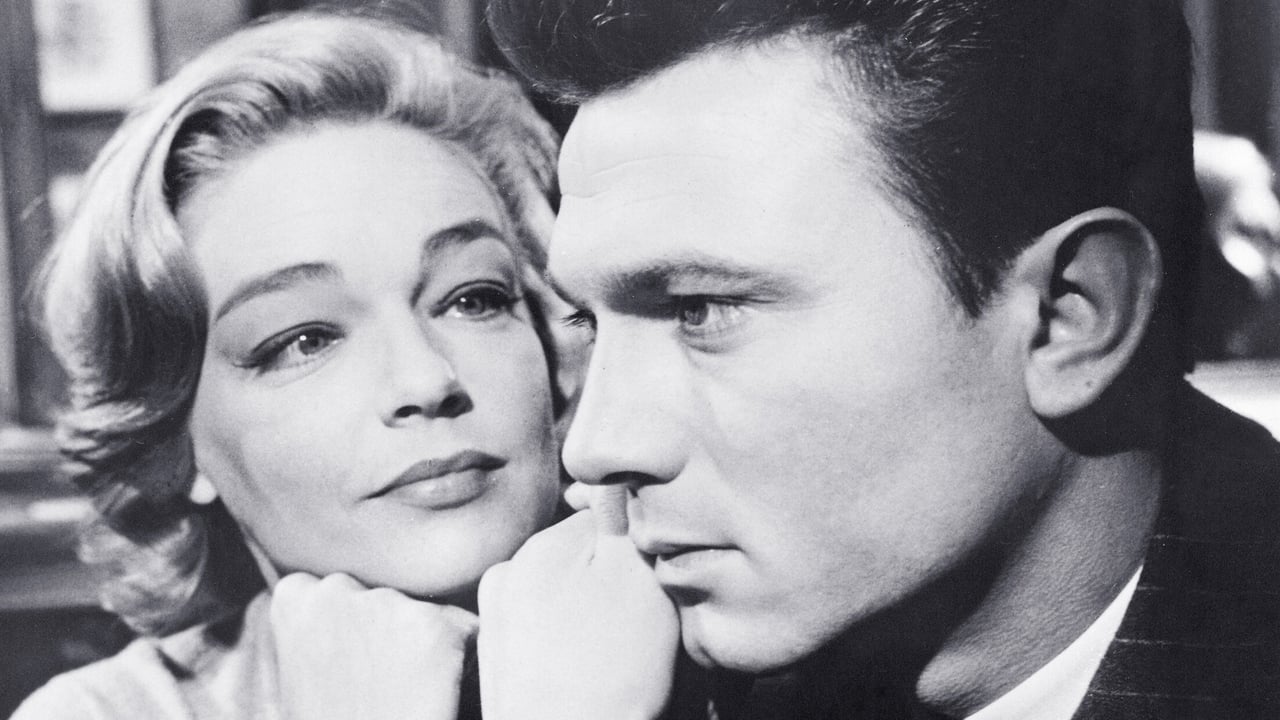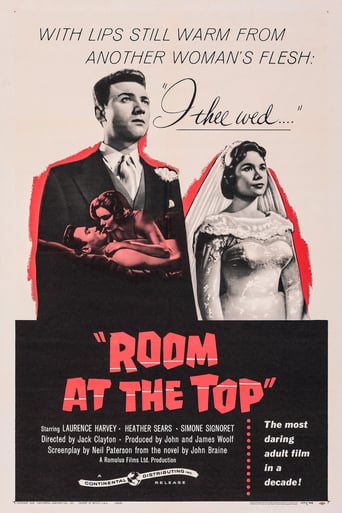

I recently read the John Brain novel and so was keen to see this celebrated adaptation of it. It was the debut feature of director Jack Clayton, two of whose relatively small number of succeeding films I've seen and enjoyed ("The Innocents" and "The Great Gatsby"). I'm a fan of the British realist cinema movement of the late 50's and early 60's and see this movie as a trailblazer for other important films which followed.Set in the immediately post-war period as witness the bomb-site locations which appear throughout as backdrops, the film unquestionably speaks to societal attitudes of masculinity, marriage, class snobbery, provincialism and morality still prevalent at its time of release in 1959.I was pleased to see in the credits that the director of photography was the great British cameraman Freddie Francis and he doesn't disappoint with typically imaginative and memorable set-ups and portraits. In one tracking shot I'm sure I detected a hand-held camera tracking shot long before it became the vogue. The story of a young working class accountant on the make is gripping and grittily portrayed, although perhaps this distinctly non-working class occupation with a taste for amateur dramatics belies the underlying class-war which underpins Lawrence Harvey's Joe Lampton character's cynical path up the greasy pole - namely to bed and wed the virginal young daughter of the monied industrialist with influence everywhere in the Northern town where his factories are based.What he doesn't count on is falling sideways into a steamy affair with older woman Alice Aisgill herself the put upon wife of her obviously philandering husband, when they meet at the local theatre rehearsing a play. At first she's just a bit-on-the-side while he works out his plan to entice sweet young Susan but Alice's worldliness and maturity speak to Joe far more than Susan's perkiness and naïveté. Of course Joe's balancing act has to fail and it does so after he cynically deflowers Susan, getting her pregnant in the process and bringing himself into the line of fire of the seemingly omnipotent father and so inadvertently gets what he originally wanted, an easy path to the upper classes and all the wealth, comfort and privilege that go with it, only when he gets up close to it, the grass is far from the verdant green he believed it would be.Clayton's direction is assured and stylish. There are many memorable scenes, perhaps none more than in the climactic scene where a newly-engaged Joe learns at his office of Alice's fate with a clever piece of overlapping dialogue. The movie is decidedly adult in its attitude to sex, not only the extra-marital affair between Joe and Alice, but also in the cold calculating way Joe takes away the too-trusting and adoring Susan's virginity. Even the language is more direct and abrasive than you'd expect, especially the tirade that Alice's flat mate Elspeth lets rip at Joe after he dazedly returns to the flat where he and Alice shared their trysts.As regards the acting, I'd have to agree with those critics who contend that Harvey just doesn't seem quite working class enough for the part. Possibly the movie came just too early for actors who would have carried off the role better like Albert Finney or Richard Harris, although their time would soon come. Simone Signoret was good value for her Oscar as the doomed Alice, but the casting all the way down the credits is uniformly good.An epochal British film, blazing a trail for the kitchen sink dramas of the next decade, but one which still stands up today on its own merits.
... View MoreThe unusual depth and range in the love between Alice (Simone Signoret) and Joe (Laurence Harvey) are what takes "The Room at the Top," to another level. However, this almost classic film doesn't always rise above its flaws. The truth is that Signoret is consistently convincing in her role, and Harvey is not. His biggest problem is his two-faced persona. He is the young, naive, rustic in one scene, and the older, authoritative, sophisticate in the next. He shifts between these two types more often than he switches accents. And his voice seems to follow the same pattern, so mellow when a yokel, so deep and masculine when a convincing dominant.This convenient inconsistency seems most apparent in his scenes with Susan Brown, where one sometimes gets the impression he is reading lines from a children's play, and yet at other times, he's the worldly older lover who cannot be bothered with such a vapid and square youth. His age seems to veer from 21 to 33, and back again, in according to the scene's mode. Unlike Signoret, Harvey doesn't adjust to the script's unevenness. He can be a faltering innocent with Alice or he can as likely be her suave superior. His juvenile jealous tirade over Alice's artist model experience is one of several examples of his character deviations. His venom here makes Mr Brown, the villainous capitalist, seem both relatively mild and complex. However, it's true that when the love scenes with Alice move beyond the literary, Harvey does achieve remarkable acting heights. Whether Simone Signoret's ability to be more than a match for her scripted lines has been transferred to him, or because she, in her first-class artistry, has covered for him, is hard to tell but, in the end, he towers, and the movie soars, despite his and its letdowns.
... View MoreROOM AT THE TOP is a fine slice of 1950s social realism and by far the best adaptation of the famous novel. It features Laurence Harvey in one of his most famous turns as a brash young accountant who falls in love with two women at the same time. The first is his boss's daughter, a perfect match if her parents weren't against it, and the second is a middle-aged Frenchwoman who offers him endless passion.This film's strength lies in the depth of psychological insight as well as the characterisation. Instead of being long-winded, the plot moves at a cracking pace, building layer upon layer to create a fully-realised world. The cast is perfect, with Simone Signoret a total turn-around from the last film I saw her in (LES DIABOLIQUES) and Harvey himself outstandingly powerful. A fine supporting cast of British character actors help to add to the general milieu and make this unmissable entertainment.
... View MoreI've always thought of "Room at the Top" as an important movie.Although the story seems anchored to life in Britain at the end of WW2, and driven by the class struggle and sense of delusion after the war, the major themes are universal.Joe Lampton (Laurence Harvey) in his attempt to rise above an impoverished background by latching onto a girl from a wealthy family has many cinematic soul brothers – Montgomery Clift in "A place in the Sun" and "The Heiress" for starters.In Joe's case, he sacrifices the woman he really loves, for comfort, security and position. Needless to say, he comes to regret that decision and therein lays the soul of this movie.It's easy to see why Simone Signoret won the Academy Award as Alice Aisgil, the older woman he loves. She is at once worldly, but vulnerable; it is painful to watch her as she realises the fragility of her relationship with Joe.Then there is Laurence Harvey. His was a difficult role, and although he may be a little too strident earlier in the movie, by the end, he inhabits Joe Lampton like a second skin.Laurence Harvey gave a certain gravitas to many movies, although his critics would seem to deny him any stature as an actor at all – I often wonder if they mixed up his off-screen life with his on-screen roles? Apparently he was promiscuous, bi-sexual, perennially late on set, and used people to gain advantage – not unlike Joe Lampton – but all that was off camera, it's not the Laurence Harvey 99.9% of us ever saw.When British actor Robert Stephens described Harvey in his autobiography as "an appalling man and, even more unforgivably, an appalling actor." It's hard to take that as a particularly astute observation when we watch not only this film, but also "Darling", "Butterfield Eight", "The Manchurian Candidate" and even "The Alamo", where Laurence Harvey's cultivated Colonel Travis is the perfect counterpoint to the testosterone charged performances of just about everyone else in the cast. But maybe those smooth good looks and that superb voice just got up the nose of less photogenic peers – there seems much peevishness in their comments.There is considerable depth to his performance in "Room at the Top", especially at the end when the anguish over what he has done breaks through his icy demeanour; it's understated and all the more powerful for it. Made in 1959, but set in the late 40's, the film looks good, and has that sense of timelessness often achieved by films made at a later date than when they are set.The sequel, "Life at the Top," made in 1965, was a polished production that had something to say about the politics of the time, and also featured a more mature performance by Laurence Harvey. However, it didn't have the immediacy of the original, which ushered in that brilliant period in British cinema in the late 50's and early 60's. History aside, "Room at the Top" is a powerful experience full of fascinating and attractive stars.
... View More